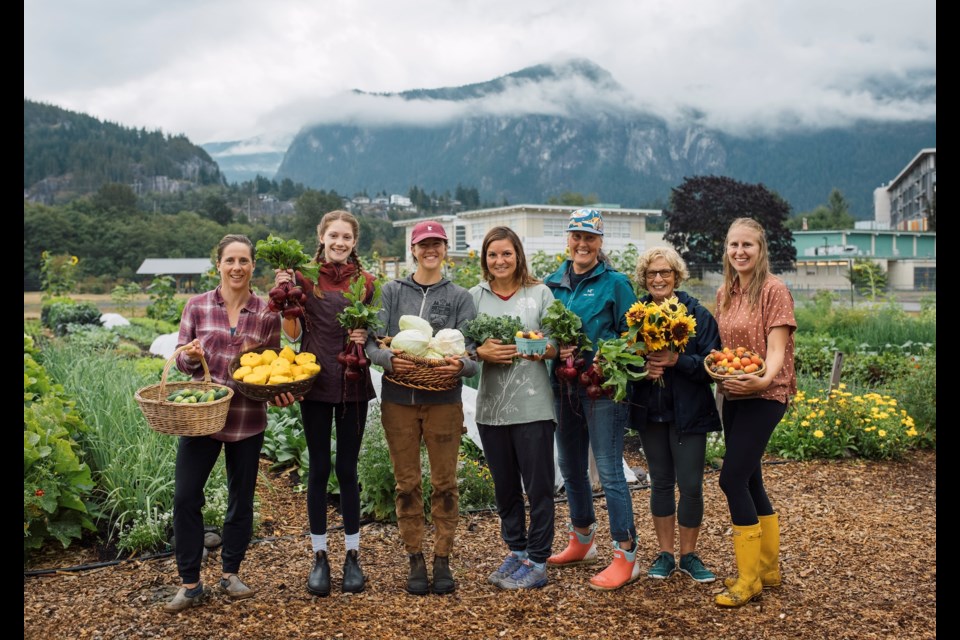It felt like a pivotal year.
According to the Squamish Climate Action Network's recently released annual report, 2024 was absolutely slam-packed with innovative projects coming to fruition or growing in popularity. With successful programs like the Downtown School Farm, the and the Sea to Sky food hub keeping everyone busy, the Sea to Sky community is increasingly embracing sustainable food security initiatives.
Part of that stems from a growing awareness of how vulnerable humans are to the effects of climate change. Executive director Krystle tenBrink believes Squamish residents are beginning to feel a sense of urgency and are taking action.
"The pandemic ironically didn't slow us down. If anything, it brought more awareness to how broken our food systems are and the need for more place-based regional food systems. More and more people want to support something like that, and strengthen the food systems within our own community," she told The С����Ƶ.
"We've seen an influx of new faces, and the demand for our services is huge."
Every new climate disaster drives home the stakes of the work they're doing.
"We're seeing how strengthening regional food systems makes us strong in light of future rock slides, pandemics, emergencies and other climate-related events. It's been interesting to see a synergy between strengthening our food systems and emergency planning for the future."
The little farm stand that could
The Downtown School Farm had record-breaking profits in 2024.
Operating one or two times per week from May through November, this small business was able to overcome challenges it faced in previous years to rake in $70,000.
Funded through the Sea to Sky School District, it attracted approximately 80 families a week. Through a pilot project, they provided 30 low-income families a vegetable box with a value of $30 for 22 weeks, plus another 20 families a box for 14 weeks.
"One of the things that sticks out to me is we're not just changing the landscape or how food and people connect, we're also a model for other schools and communities that can do it in their own towns. We work with other communities across the province and beyond," said tenBrink.
"We're actively working with a school district outside Prince George, supporting them getting their school farm up and running."
Taking the time
It took some time, but it was worth it.
In 2024, Squamish CAN embarked on a project to create an Indigenous garden. It is intended as a space for all students and community members to relax, reflect and connect with Indigenous plants, while learning the cultural significance and pronunciation of them in the Sḵwx̱wú7mesh language.
The garden was constructed last spring, and then Jasmine Baker (Długwa̱la) provided translations and audio to support the learning and interactivity of the signage featured on our website and in-situ at the garden.
Local artist and teacher Sarah Keller was then commissioned to develop illustrations of the plants based in the garden, which became the basis for the signage.
According to the report, decolonizing climate action is a priority for Squamish CAN, and they have committed to integrating Indigenous wisdom and traditions into their work.
"We recognize that climate change is rooted in colonial structures and practices. The negative impacts of climate change are borne disproportionately by Indigenous communities, and our organization is influenced by colonial practices," it reads.
That's why the garden is such an important step.
"This was a really beautiful process and story that came together over a long period of time. While we were working on it we really wanted to take our time," tenBrink said.
"We had Squamish Nation Elders, teachers from Howe Sound and other leadership, plus so many students and really wonderful people as part of this project. We're excited to have our spring opening in 2025, when we'll invite everyone to experience it for themselves."
Securing the future
Squamish CAN has also been busy expanding its operations.
Their latest acquisition is a half-acre community farm on Raven Drive, which is set to open in 2026. Meanwhile, they've been fundraising to continue support for the Squamish-Lillooet Food Hub project, which has raised $55,000—paving the way to provide support for regional farmers and agri-food producers.
The report further details their work creating edible gardens at schools and hosting events such as their repair cafes, which drew over 1,000 attendees and facilitated the repair and swapping of hundreds of items.
"I feel we've been incredibly successful over the past year, and we may even take on too much at times. We're learning how to balance that by being more strategic. We have a fantastic team of staff and volunteers and board members who are instrumental," tenBrink said.
"They allow the organization to thrive, not just as a whole, but as each individual entity."
To get involved, sign up for Read the.



